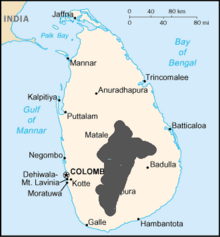Sri Lanka blue magpie
| Sri Lanka blue magpie | |
|---|---|
 |
|
| at Sinharaja Forest Reserve, Sri Lanka | |
| Scientific classification | |
| Kingdom: | Animalia |
| Phylum: | Chordata |
| Class: | Aves |
| Order: | Passeriformes |
| Family: | Corvidae |
| Genus: | Urocissa |
| Species: | U. ornata |
| Binomial name | |
|
Urocissa ornata (Wagler, 1829) |
|
 |
|
| Distribution map for Sri Lanka Blue Magpie | |
The Sri Lanka blue magpie or Ceylon magpie (Urocissa ornata) is a member of the crow family living in the hill forests of Sri Lanka, where it is endemic.
This is a species of a dense wet evergreen temperate rain forest. It is declining due to loss of this habitat. Sri Lanka Blue Magpie is usually found in small groups of up to six or seven birds. It is largely carnivorous, eating small frogs, lizards, insects and other invertebrates, but will eat fruit.
The cup-shaped stick nest is in a tree or shrub and there are usually 3–5 eggs laid. The eggs are white heavily spotted with brown. Both sexes build the nest and feed the young with only the female incubating them.
The Sri Lanka blue magpie is about the same size as the European magpie at 42–47 cm. The adults are blue with chestnut head and wings, and a long white-tipped tail. The legs and bill are red. The young bird is a duller version of the adult.
The Sri Lanka blue magpie has a variety of calls including mimicry, a loud chink-chink and a rasping krak-krak-krak-krak.
In Sri Lanka, this bird is known as Kehibella (කැහිබෙල්ලා) in Sinhalese. The blue magpie appears in a 10c Sri Lankan postal stamp, which was in wide usage in the 1980s through 1990s.
...
Wikipedia

